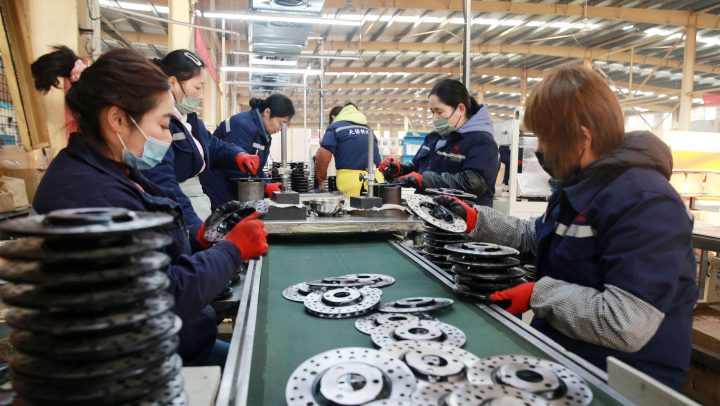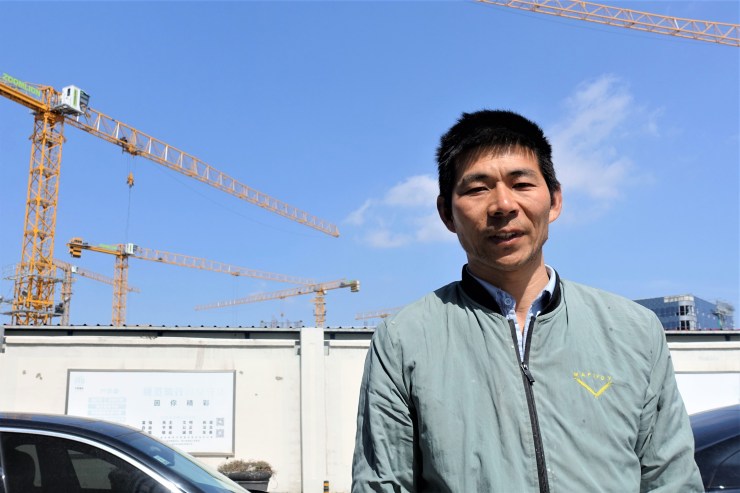
Why more workers in China are ruling out factory jobs

Over the last two decades, Zhang Xianfeng has dabbled in working as a movie extra and renovated homes. But he’s spent most of his time in factories manufacturing furniture and Apple iPhone accessories. These days, he works in construction.
“I work nine hours a day. I get paid 300 yuan [$44] per day. My job is to carry materials like cement, glue and ceramic tiles,” Zhang said during his lunch break recently. “It is better than a factory job because you don’t have to do overtime. Anyway, the pay is better.”
He is not the only one who has left the factories. Last year, 83% of Chinese manufacturers were short hundreds or thousands of employees, accounting for 10% to 30% of their workforce, according to a survey by government-owned consulting firm CIIC.
This is partly because China’s population dropped for the first time last year and its workforce has been shrinking since 2012. Still, that should be partially offset by China’s high levels of unemployment after nearly three years of Beijing’s zero-COVID policy. In January and February, the jobless rate was 5.6% overall, while unemployment surged to 18.1% for people age 16 to 24.
Typically, when there are more workers than jobs, employers can be choosier. But that doesn’t seem to be the case for manufacturers in China. Zhang said job candidates are wary of that group of employers.
“A lot of factories deceive workers. They tell us the salary is 25 yuan or even 30 yuan [$3.60 to $4.40] an hour. Then, when we get to the factory, the real pay is lower or the work environment is horrible,” he said.
The working environment got worse under China’s zero-COVID policy. To keep churning out products for the rest of the world, factories operated a so-called closed-loop system in which staff were made to eat and sleep on site.
Last fall, a wave of infections hit the central Chinese city of Zhengzhou, where Apple supplier Foxconn manufactures most of the iPhones.
“If you had a fever, your dorm would be sealed and you didn’t get food or medicine,” said Hunter, who has worked at Foxconn on and off over the past decade. He gave only his English name for fear of reprisals.
Foxconn did not address this specific allegation but, in a statement to the media at the time, said it was in a “protracted battle” to care for its employees during the outbreak and asked for the public’s understanding. In a statement to Marketplace, Foxconn emphasized that the health and safety of its employees has always been its “top priority.”
“Our Zhengzhou campus is a very large complex and requires strong management capabilities to adhere to [pandemic] prevention regulations and operate production normally,” Foxconn added.
Just as orders for iPhone 14s were rolling in, workers who feared for their safety were streaming out.
“Foxconn recruited some new workers from poorer provinces, promising them 30 yuan an hour plus bonuses,” Hunter said. “Maybe the employment agencies or job ads weren’t clear enough, but when the workers arrived, they found the terms had changed.”
Anger and frustration — stoked by fears about infected people working alongside healthy ones and the endless COVID quarantines — drove workers to protest and clash with riot police at the Foxconn factory in November. The company said it was “patently untrue” that it kept infected workers on site; it also blamed the payment issue on a technical error. The incident has led to delays in delivering iPhone 14s.

Many workers who spoke to Marketplace regard Foxconn as better than some other factories, but conditions can be worse when manufacturers hire through employment agencies. Worker advocacy groups say this method allows factories and big international brands to avoid liability for possible labor violations.
Employment agents like Jia Jin in Yunnan province admits there are some bad recruiters, but he also argues that workers have no loyalty.
“A lot of workers like to hop from one factory to the next in search of better offers. But factories need stability or they’ll never complete orders. My job is to help them,” Jia said.
He and his wife have traveled through Yunnan province searching for people to work in factories, without much luck. Jia said young people bear some responsibility for the high unemployment rate.
“Some young ones, especially those who graduated from an OK college, are too embarrassed to take a job that is labor-intensive or where the salary is too low,” Jia said.
To earn more money, factory workers have to work overtime. However, just because they put in the extra hours does not mean they are happy about it.
“Workers like to work overtime, not because they really like it but because the base salary is too low,” Hunter said.
Former factory worker Zhang said factories can’t find workers despite high unemployment because of one main reason: “The workers just don’t trust factory owners.”
And, he added, he hopes he will never have to take a job in a factory again.
Additional research by Charles Zhang.
There’s a lot happening in the world. Through it all, Marketplace is here for you.
You rely on Marketplace to break down the world’s events and tell you how it affects you in a fact-based, approachable way. We rely on your financial support to keep making that possible.
Your donation today powers the independent journalism that you rely on. For just $5/month, you can help sustain Marketplace so we can keep reporting on the things that matter to you.

















